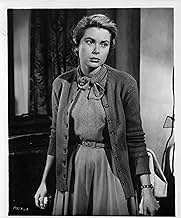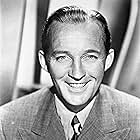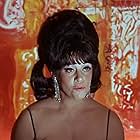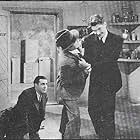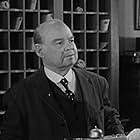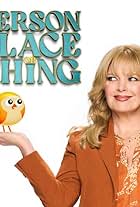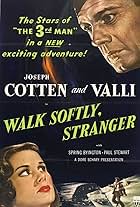Un regista assume un ex alcolizzato e inizia una turbolenta relazione con la moglie di un attore, che lui sia la causa di tutti i suoi problemi.Un regista assume un ex alcolizzato e inizia una turbolenta relazione con la moglie di un attore, che lui sia la causa di tutti i suoi problemi.Un regista assume un ex alcolizzato e inizia una turbolenta relazione con la moglie di un attore, che lui sia la causa di tutti i suoi problemi.
- Vincitore di 2 Oscar
- 8 vittorie e 11 candidature totali
- Bar Patron
- (non citato nei titoli originali)
- Performer in Play
- (non citato nei titoli originali)
- Restaurant Patron
- (non citato nei titoli originali)
- Dancer with Pick
- (non citato nei titoli originali)
- Waiter
- (non citato nei titoli originali)
- Restaurant Patron
- (non citato nei titoli originali)
- Performer in Play
- (non citato nei titoli originali)
Trama
Lo sapevi?
- QuizBing Crosby almost turned down the film because he thought he was too old for his character and wouldn't be able to play him.
- BlooperDuring the first New York show, when Cook visits Bernie's dressing room, telegrams can be seen inserted into the frame of the mirror. One angle shows a telegram in the top right corner of the mirror. Another angle shows a gap between the right side of the frame and the telegram.
- Citazioni
Georgie Elgin: Let's say I try my small way to help.
Bernie Dodd: That's what my ex-wife used to keep me reminding of, cheerfully. She had a theory that behind every great man there was a great woman. She also was thoroughly convinced that she was great and all I needed to qualify was guidance on her part.
Georgie Elgin: Still does not prove that the theory is completely wrong. I imagine one can go through history and find a few good examples.
Bernie Dodd: It's a pity that Leonardo da Vinci never had a wife to guide him, he might have really gotten somewhere.
- ConnessioniEdited into Mika: Grace Kelly (2007)
- Colonne sonoreDissertation on the State of Bliss (Love and Learn Blues)
by Harold Arlen and Ira Gershwin
Sung by Jacqueline Fontaine and Bing Crosby
Grace Kelly won an Oscar as the faithful, strong-willed, bitter, dowdy co-dependent wife of crooner Crosby who played a whimpering, guilt-ridden alcoholic. You have to see Grace Kelly in the bags-under-her-eyes make-up and spinster get-ups to believe it. She looks at least ten years older than her 25 years with a sour puss of a face and an attitude to match. I think she won best actress (over Judy Garland in A Star Is Born) partly because her appearance was so stunningly...different. (While I'm musing, I wonder if this was the film of hers that was banned in Monaco.) It would seem to be the height of creative casting to put her into such a role, yet she is excellent, wonderful to watch as always, her timing exquisite, her expression indelible, and her sense of character perfect. When she says to Holden, "You kissed me--don't let that give you any ideas," and then when we see her face after he leaves, loving it, we believe her both times.
Bing Crosby too is a sight to behold in what must have been his finest 104 minutes as a dramatic actor. He too played way out of character and yet one had the sense that he knew the character well. He was absolutely pathetic as the spineless one. (In real life Der Bingo was reportedly a stern task master at home--ask his kids.) Clearly director Seaton should be given some of the credit for these fine performances. When your stars perform so well, it's clear you've done something right.
The production suffers--inevitably, I suppose--from the weakness of the play within the play. Crosby is to be the star of a Broadway musical called "The Land Around Us." (What we see of the musical assures us it's no Oklahoma!) He's a little too old and stationary for the part, but of course he sings beautifully. (Painful was the excruciatingly slow audition scene opening the movie with Crosby singing and walking through a thoroughly boring number.) Holden is the director and he is taking a chance on Crosby partly because he believes in him and partly because he has nobody else. Naturally if Crosby returns to the bottle, everything will fall apart.
What about the nature of alcoholism as depicted by Odets? Knowing what we now know of the disease, how accurate was his delineation? I think he got it surprising right except for the implied cause. Crosby's character goes downhill after the accidental death of his son, which he blames on himself. Odets reflects the belief, only finally dispelled in recent decades, that alcoholism was indicative of a character flaw, as he has Crosby say he used his son's death as an excuse to drink. Today we know that alcoholism is a disease, a chemical imbalance. Yet Odets knew this practical truth (from the words he puts into the mouth of William Holden's character): an alcoholic stops drinking when he dies or when he gives it up himself. It is interesting to note that as a play The Country Girl appeared in 1950, the same year as William Inge's Come Back, Little Sheba, which also dealt with alcoholism. The intuitive understanding of alcoholism by these two great playwrights might be compared with the present scientific understanding. (See for example, Milam, Dr. James R. and Katherine Ketcham. Under the Influence: A Guide to the Myths and Realities of Alcoholism [1981] or Ketcham, Katherine, et al. Beyond the Influence: Understanding and Defeating Alcoholism [2000].)
Here's a curiosity: the duet song (best number in the movie; Crosby sang it with Jacqueline Fontaine) has the lyric "What you learn is you haven't learned a thing," which is what the alcoholic learns everyday.
And here's a familiar line, cribbed from somewhere in the long ago: Fontaine asks Crosby aren't you so-and-so, and he replies, "I used to be."
(Note: Over 500 of my movie reviews are now available in my book "Cut to the Chaise Lounge or I Can't Believe I Swallowed the Remote!" Get it at Amazon!)
- DennisLittrell
- 18 ott 2002
- Permalink
I più visti
Dettagli
- Tempo di esecuzione1 ora 44 minuti
- Colore
Contribuisci a questa pagina



